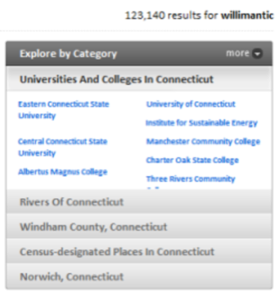Last night, the new search engine Cuil launched out of stealth-mode. As some had predicted, it seems Google’s announcement about the size of its search index was a preemptive move to take some momentum away from one of Cuil’s main features: the size of its index with 120 billion pages. As Cuil’s team features quite a number of Google alumni, comparisons with Google’s search are inevitable. In our tests, however, Cuil performed nowhere near as well as Google.

Layout

The Cuil homepage is a study in simplicity, with a black background, the Cuil logo, and the search box as its only major design elements. The search form is supposed to return typing suggestions, but this didn’t work for us on any browser we tested. Maybe Cuil turned this off for the time being to take some load of its servers. Update: The typing suggestions are now working again.
Cuil takes a very different approach to displaying its results. Instead of a list, it displays results in three columns (though you can switch to a two-column view as well). Intuitively, it would seem that the most important results would be in the top left corner, but Cuil does not make this explicit. The top right spot is reserved for related searches, which usually displays either five or ten main suggestions and then, on mouse-over, slides open and reveals a more detailed selection.
Related Searches
Cuil prominently features its related searches, both in the box on the top right, as well as in a bar right underneath the search box. Overall, these seem to work surprisingly well. Thanks to the ability to quickly go down two levels of related searches, this function works better than the similar features in Yahoo Search, Ask, and Live Search, though they are not as extensive as the related searches on Clusty. Google tested a layout with prominently featured related searches last year, but hasn’t made it a default feature.

The results Cuil displays in the related searches are usually relevant, though often, like in our search for ‘Portland, OR,’ it returned some strange results as well. For Portland, it seemed to think that we would also be interested in “Airlines of the United States” and “Regional Airline of the United States.”
Unlike Google and its brethren, Cuil does not check your spelling and does not make an effort to suggest the correct search terms for you.
Test Searches
Of course, we couldn’t do a comprehensive test of Cuil’s 120 billion page index, but we did a couple of test searches and the results Cuil returned were often disappointing. Our search for ‘Cessna 152,’ one of the most popular general aviation training aircraft, gave us links to Wikipedia and the Cessna company on the big three search engines. Cuil, on the other hand, linked to an online store with manuals for sale.
On the other hand, searches for ‘Linux’ or other computing terms usually returned pretty good results and good suggestions for ‘related searches’.’
Searching for people, however, was often a disappointment. While it worked great for historical figures, prominent bloggers were often nowhere to be found.
In our search for “Portland, OR,” Cuil failed completely. Its top result was a link to a local Best Western hotel. Interestingly, a search for “Portland” only, however, gave us great results.

No Wikipedia?
One thing we noticed in our searches was the Cuil never returned any results from the Wikipedia. It isn’t clear if Cuil is biased against displaying these, but it seems like a strange omission. Especially in our searches for historical figures, the results would have been far better if they had included Wikipedia articles. The top results for “Hitler Biography,” for example, is a biography on BioAndLyrics, a site which copies the related Wikipedia article and suggests we also look at his discography.
Still Changing
One thing we noticed in our tests was that Cuil seems to be tweaking its servers constantly. Searches that returned no results last night now display thousands of links, while others, like our “Portland, OR” search above, stopped returning results completely for a while. Some of this could be explained by Cuil getting slammed with traffic right now (the site did slow down quite often during out tests), but that would also suggest that their system isn’t quite as stable as it should be. Right now, for example, Cuil doesn’t even display results for ‘computers.’
Good, but not Great
Google, as well as Microsoft and Yahoo, profit from the simple fact that they have a far larger portfolio of sites to work with. A search for a city on the big three search engines, for example, will often display a map as one of the top results, while Cuil does not have that option. Similarly, searches for a stock symbol will show the performance of that stock in a little graph as one of the top results in Google, Live Search, and Yahoo Search, while Cuil, with some luck, returns a link to Yahoo’s finance page as the top result, but without linking to the actual stock’s page on Yahoo finance.
When it comes to current events, Google’s results are simply fresher than Cuil’s, thanks mostly to the results from Google News being displayed as part of the main search results.
Verdict
Overall, our experience with Cuil was a bit uneven. While the related searches often are very well chosen, the actual search results are disappointing. Cuil says it ranks results by the content on the pages only and not by popularity – however, it seems like this makes it a bit more susceptible to SEO manipulations, as some of our tests showed.
On some levels, Cuil doesn’t feel like it is quite ready for prime time yet – even the links from its about page mostly display 404 errors. As of now, it’s a worthy challenger and the size of its search index is impressive, but in the end, all consumers are going to care about is the quality of the search results, and there, Cuil’s results are still too inconsistent.
UPDATE: Also see Wow, How Did Cuil Get So Much Publicity on Day 1?!










